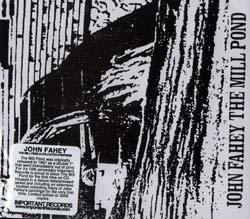
Originally issued as two 7" vinyl discs, Important Records has collected "The Mill Pond" on a single, relatively brief CD, issuing it in an attractive package that includes a booklet with 32 reproductions of Fahey's paintings. Recorded in 1997, it fits in well with other work from that late period in Fahey's career ("City of Refuge", "Womblife") wherein references to the bluegrass and folk picking upon which his reputation rests are tangential at best. Instead, his rich guitar often serves as a single element in a vicious, dense and crude maelstrom of electronics, an unspecified amount of which (though one suspects a good deal) is credited to Jeff Allman.
The first and last of the four tracks serve as something of brackets, each containing the highest ratio of acoustic guitar work, surrounding the more abstract core of cuts 2 & 3. While "Ghosts" doesn't allude directly to the classic Ayler piece it is indeed rather otherworldly, Fahey's heavy, low sitar-like strumming offset by his equally dark vocal moans sounding very much out of a Tuvan conception even if he doesn't quite achieve the overtones. Then comes the plunge into electronics, first with "Garbage", then "You Can't Cool Off in the Mill Pond, You Can Only Die". Fahey's) use of field recordings and other electronic enhancements was always brutal, even crudely na´ve though it seems in character with the bleak outlook of his later career. One can make connections between the massive whorls of sound and the paintings selected for inclusion here, many of them consisting of violent collisions of heavily applied pigment, several having a similar art brut/animist aspect to those of Don Van Vliet. "Garbage" sounds like some enormous eddy, a cavernous whirlpool in constant flush mode, swallowing entire households full of detritus. The following cut ups the harrowing ante even more, blending in those moans and harsh strums from "Ghosts" and metallically echoing the electronica; very effective. Again, how much of this conception can be credited to Allman is not indicated. The cheerily titled, "The Mill Pond Drowns Hope" foregrounds some lovely, reverberating guitar, the electronics taking on a troubling, harmonium-like presence beneath. Despite the title, Fahey's guitar sends out very hopeful plaints, beautiful ringing notes recalling his classic music from the late 50s and early 60s. Halfway through, though, what appears to be a distorted version of his vocalizing wells up, bellowing in pain, an awful yin to the guitar's yang; a very powerful track.
All told, "The Mill Pond" easily fits into the other fine if awkward releases from Fahey's last decade and is a mandatory purchase for admirer's of this great musician.
Comments and Feedback:
|



